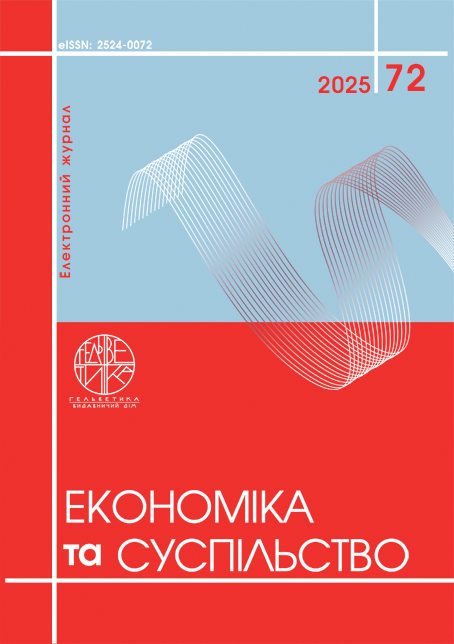COMPETITIVE ADVANTAGES IN THE SYSTEM OF MANAGING ENTERPRISE COMPETITIVENESS
Abstract
The purpose of this article is to explore the concept of competitive advantages and examine its significance in enhancing the competitiveness of enterprises within today’s rapidly evolving market context. The article emphasizes the critical importance of mobilizing resources and implementing innovative practices to meet the changing demands of consumers. Methodology of research. To address this topic, the study employs a qualitative approach, utilizing theoretical analysis to dissect the multidimensional aspects of competitive advantages, including key characteristics such as relativity, dynamism, adaptability, and sustainability, which are essential for maintaining a competitive edge. A comparative analysis of the academic literature on competitive advantages and their implementation was carried out. Findings. The study reveals that companies effectively identifying and cultivating their unique capabilities, including advanced technologies and high-quality human resources, are better equipped to navigate market challenges, thereby outperforming competitors. It underscores the necessity for organizations to continuously innovate and adapt their strategies to retain their competitive positions. Originality. This article contributes to the existing body of knowledge by synthesizing various theoretical perspectives on competitive advantages, presenting a comprehensive framework that reflects contemporary market realities. The insights provided offer a fresh understanding of how competitive advantages can be leveraged strategically in the context of ongoing change. Practical value. The practical implications of this research are significant for business leaders and decision-makers, providing frameworks and actionable recommendations that guide organizations in formulating sustainable competitiveness strategies. By applying the principles outlined in the article, businesses can enhance their strategic planning efforts, ensuring long-term success in a competitive landscape.
References
Kumar, S., Sureka, R., Lim, W. M., Kumar Mangla, S., & Goyal, N. (2021). What do we know about business strategy and environmental research? Insights from Business Strategy and the Environment. Business Strategy and the Environment, 30(8), 3454-3469.
Hewitt, L. M., & Van Rensburg, L. J. J. (2020). The role of business incubators in creating sustainable small and medium enterprises. The Southern African Journal of Entrepreneurship and Small Business Management, 12(1), 9.
Onufrey, K., & Bergek, A. (2021). Transformation in a mature industry: The role of business and innovation strategies. Technovation, 105, 102190.
Basset, M. A., Mohamed, M., Sangaiah, A. K., & Jain, V. (2018). An integrated neutrosophic AHP and SWOT method for strategic planning methodology selection. Benchmarking: An International Journal, 25(7), 2546-2564.
Latifah, L., Setiawan, D., Aryani, Y. A., & Rahmawati, R. (2021). Business strategy–MSMEs' performance relationship: innovation and accounting information system as mediators. Journal of Small Business and Enterprise Development, 28(1), 1-21.
Chen, D. C., & Chen, T. W. (2021). Research on sustainable management strategies for the machine tool industry during the covid-19 pandemic in Taiwan. Sustainability, 13(23), 13449.
Hamel, G., & Prahalad, C. K. (2017). Do you really have a global strategy?. In International Business (pp. 285-294). Routledge.
Christensen, C. M., McDonald, R., Altman, E. J., & Palmer, J. E. (2018). Disruptive innovation: An intellectual history and directions for future research. Journal of management studies, 55(7), 1043-1078.
Collins, J. (2019). Turning the flywheel: A monograph to accompany good to great. Random House.
Guzman, M., & Stiglitz, J. E. (2024). Post-neoliberal globalization: international trade rules for global prosperity. Oxford Review of Economic Policy, 40(2), 282-306.
Коценко M. C. Забезпечення конкурентних переваг підприємництва / Коценко М. С. // Трансформація практики управління інноваційним розвитком соціально-економічних систем : колективна монографія / під заг. ред. Храпкіної В. В., Пічик К. В. ; Національний університет "Києво-Могилянська академія". - Київ : Видавничий дім "Києво-Могилянська академія", 2024. - [Підрозділ] 2.4. - C. 149-168.
Валінкевич, Н. В., & Коценко, М. С. (2025). Теоретичні аспекти формування конкурентних переваг торговельного підприємства. Проблеми сучасних трансформацій. Серія: економіка та управління, (17).
Kumar, S., Sureka, R., Lim, W. M., Kumar Mangla, S., & Goyal, N. (2021). What do we know about business strategy and environmental research? Insights from Business Strategy and the Environment. Business Strategy and the Environment, 30(8), 3454-3469.
Hewitt, L. M., & Van Rensburg, L. J. J. (2020). The role of business incubators in creating sustainable small and medium enterprises. The Southern African Journal of Entrepreneurship and Small Business Management, 12(1), 9.
Onufrey, K., & Bergek, A. (2021). Transformation in a mature industry: The role of business and innovation strategies. Technovation, 105, 102190.
Basset, M. A., Mohamed, M., Sangaiah, A. K., & Jain, V. (2018). An integrated neutrosophic AHP and SWOT method for strategic planning methodology selection. Benchmarking: An International Journal, 25(7), 2546-2564.
Latifah, L., Setiawan, D., Aryani, Y. A., & Rahmawati, R. (2021). Business strategy–MSMEs' performance relationship: innovation and accounting information system as mediators. Journal of Small Business and Enterprise Development, 28(1), 1-21.
Chen, D. C., & Chen, T. W. (2021). Research on sustainable management strategies for the machine tool industry during the covid-19 pandemic in Taiwan. Sustainability, 13(23), 13449.
Hamel, G., & Prahalad, C. K. (2017). Do you really have a global strategy?. In International Business (pp. 285-294). Routledge.
Christensen, C. M., McDonald, R., Altman, E. J., & Palmer, J. E. (2018). Disruptive innovation: An intellectual history and directions for future research. Journal of management studies, 55(7), 1043-1078.
Collins, J. (2019). Turning the flywheel: A monograph to accompany good to great. Random House.
Guzman, M., & Stiglitz, J. E. (2024). Post-neoliberal globalization: international trade rules for global prosperity. Oxford Review of Economic Policy, 40(2), 282-306.
Kotsenko M. C. Zabezpechennia konkurentnykh perevah pidpryiemnytstva / Kotsenko M. S. // Transformatsiia praktyky upravlinnia innovatsiinym rozvytkom sotsialno-ekonomichnykh system : kolektyvna monohrafiia / pid zah. red. Khrapkinoi V. V., Pichyk K. V. ; Natsionalnyi universytet "Kyievo-Mohylianska akademiia". - Kyiv : Vydavnychyi dim "Kyievo-Mohylianska akademiia", 2024. - [Pidrozdil] 2.4. - C. 149-168.
Valinkevych, N. V., & Kotsenko, M. S. (2025). Teoretychni aspekty formuvannia konkurentnykh perevah torhovelnoho pidpryiemstva. Problemy suchasnykh transformatsii. Seriia: ekonomika ta upravlinnia, (17).

This work is licensed under a Creative Commons Attribution 4.0 International License.


